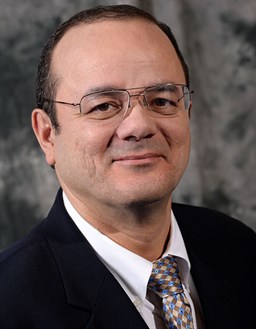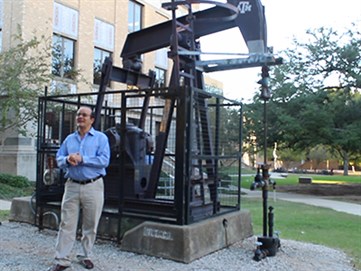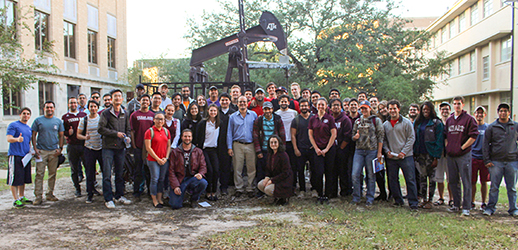
During the annual pregraduation celebration held in the Harold Vance Department of Petroleum Engineering, graduating students are recognized for outstanding performance, service and other worthy attributes, as voted on by faculty and their peers. But senior students also have an opportunity to vote on and bestow one of the most coveted faculty awards in the department: the Petroleum Engineering Department Award for Excellence in Teaching. Established by Dennis Johnson ’74, and Amy and Tim Leach ’82, this award recognizes full-time faculty members who maintain high expectations of their students and ensure academic rigor in their undergraduate classes.
This year’s Excellence in Teaching winner is professor of engineering practice Dr. Ibere Nascentes Alves, and this is the second year in a row he has received it.

For the past three years, Alves has embraced teaching at Texas A&M University. He is the instructor for PETE 325, petroleum production systems. In this course, students follow the path of fluids from reservoir to well to surface flowlines and onward through separation facilities to the sales line (hydrocarbons) or other outlets (produced water re-injection, disposal, etc.).
“Along the way students learn the different components of the flow systems, their functions, and a bit about how to design systems based on fluid throughput expectations,” said Alves. “(Students) look at improving flow into the well by artificial lift, or lowering bottom hole pressure, and stimulation (to improve) near-well flow in the reservoir. This prepares (students) to have a more positive experience in their internship during the summer, due to their greater appreciation for how oil and gas production works.”
When he is not in class, Alves is in his office, passionately explaining theories and practical applications to students who want to know more. He actively volunteers for the annual department student paper contest, and helped out with the department undergraduate video. He recently arranged a demonstration of Aggie Well No. 1 for his students so they could observe the most utilized artificial lift method for bringing fluid up from a reservoir, the so-called “Sucker Rod Lift System” that uses a pump jack mechanism. He also gave his students a demonstration in the Lohman Lab on the three-phase separator, where students witnessed the processes that take place inside a separator and learned more about the physical principles that controls the fluids separation process.

As a professor of practice, Alves offers students at Texas A&M a unique focus of instruction based on his vast industry experience, and he is excited to share his knowledge with them. Originally from Brazil, Alves worked for Petrobras for 35 years as an engineer, academic and researcher before retiring to become a full-time educator. A few years ago, he gave a graduate student seminar presentation at Texas A&M and spoke with some of the professors in the department. Once he toured campus, he was enchanted by our school spirit and gladly accepted an invitation to join the faculty.
Alves was a mechanical engineer, fresh from school, when he joined Petrobras. At the time, there were refineries in Brazil but only a small amount of oil production. Petrobras had just started offshore exploration. He took a short company course and then received a hands-on introduction to petroleum engineering out in the field. He enjoyed the challenges and strove for efficiency while supplying his country with energy for economic and social change.
Through the years, he attained his master’s and doctoral degrees and taught courses in addition to doing his professional work. He soon learned he loved teaching as much as he loved petroleum engineering.
“There is discovery in a university, an exchange with the youth,” said Alves. “I give the students these ideas and, as a return, I love to see their faces when they understand what they learn. They can start better than I started. I want the students here to give a chance to everything, to look for new things and grow.”
